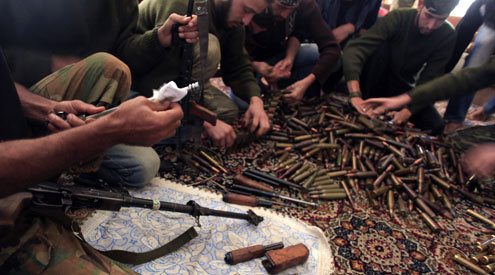By Roy Gutman — McClatchy Newspapers

Rebels clean their weapons and check ammunition Wednesday at their base on the outskirts of Aleppo, Syria.
Khalil Hamra — AP
Read more here: http://www.bradenton.com/2012/11/14/4279104/obama-says-he-wont-embrace-syrias.html#storylink=cpy
ISTANBUL, Turkey — Unlike France, Saudi Arabia and several other U.S. allies in the Gulf, President Obama Wednesday held back from recognizing a new Syrian opposition group as the core of a government-in-exile, a caution that appeared to reflect concern over issues that have emerged since its formation on Sunday.
Questions have arisen about the views of the head of the group, moderate cleric Moaz al Khatib, and the influence of the Islamist Muslim Brotherhood on the new organization, which since Sunday has operated under the ungainly name: the National Coalition for Syrian Revolutionary and Opposition Forces.
Obama said he wanted to make sure that the opposition is “committed to a democratic Syria, an inclusive Syria, a moderate Syria” to replace the regime of Bashar Assad and added: “We have seen extremist elements insinuate themselves into the opposition.”
He no doubt had in mind the presence of Islamists among the Syrian fighters on the ground, including some with reputed ties to the al Qaida terror organization, but U.S. officials in the past have also voiced concern over the influence over émigré politics of members of the Muslim Brotherhood.
During the presidential election campaign that ended two weeks ago with Obama’s re-election, Republican challenger Mitt Romney repeatedly referred to the victory of the Muslim Brotherhood in Egypt as a major setback to U.S. interests. In their foreign policy debate, Obama did not dispute the characterization.
In its first major organizational decision on Wednesday, the new National Coalition announced it was setting up its headquarters in the Egyptian capital. The Egyptian foreign ministry said it would place “all our capacities at their disposal.”
While the new Coalition undoubtedly was signaling a break with the Syrian National Council, the single biggest émigré political body, which had been based in Turkey, the move to Cairo ensures that the Brotherhood-led government in the most important Arab state will have more than a minor influence on the Syrian opposition.
Members of the Brotherhood already had gained substantial influence on the Council, including its decision last Friday to reorganize and revamp its operations and to elect George Sabra, a Christian geography teacher, as its president.
“A lot of Syrian opposition people were down on the Sabra appointment,” said Joshua Landis, a Syria specialist and director of the Center of Middle Eastern Studies at the University of Oklahoma. “They saw it as a trick and a hypocritical move, because Sabra wasn’t even elected to the Secretariat General” of the Council, he told McClatchy.
Brotherhood members did this by committing their bloc of 10 votes in the 41 seat General Secretariat first to add Sabra to the executive committee and then to elect him president. Christians comprise only about 10 per cent of the Syrian population, and lacking a sizable constituency of his own, Sabra could only feel beholden to the Brotherhood, he said.
While the United States and other western powers want the new Coalition to supplant the Council, the Brotherhood is sure to retain its influence. A leading Brotherhood member told McClatchy that no more than six of the 63 in the Coalition’s membership are from his group. Yet with 22 of the Coalition seats occupied by members of the Council, and given that the Brotherhood has a significant influence on the Council, it seems likely to retain a substantial role in émigré politics.
Amr al Azm, a Syrian American who teaches Middle East history at Shawnee State University in Ohio, calculates that the Brotherhood effectively controls half of more of the seats in the new Coalition.
Analysts of Syrian politics point out that the Brotherhood has had almost no role or presence in Syria, since Assad’s father, Hafez, conducted a murderous crackdown against the Brotherhood in Hama in 1981, killing at least 10,000 civilians. Since Syrians took to the streets in March 2011 to demand Bashar Assad’s overthrow, Brotherhood members have proved the most astute of the émigré politicians in the tactics of political organization.
There are other reasons for Washington not to jump too fast into supporting the Coalition, even though open U.S. pressure was a reason that it was set up to replace the Council. “The Coalition is fairly fragile,” said Azm. “It’s a totally untested entity. Plus the fact is the people themselves are untested.”
The third cause for concern appears to be Khatib, a widely respected cleric, whose views on Syria’s future do not square with the U.S. government’s preferred course of action. In July, shortly after émigrés met in Cairo and drafted two documents of intent on running Syria, Khatib posted a statement on his web site, expressing disappointment that the documents did not refer to Islamic Sharia law.
“It was part of a wider Brotherhood campaign to stir up anti-Cairo feelings,” Azm recalled. “It wasn’t just about Sharia. They were worried that the plan was too secular.” He said the posting “may come back to haunt” Khatib.
Unless there’s a screen-save out there with the full text, it would be difficult to prove that Khatib said that, however. There was a gap in the postings on the site yesterday – from November 2011 through September 2012.
Members of the Coalition and the Council will meet western leaders in London Friday to discuss western government plans to step up humanitarian aid to Syrians fighting to overthrow Assad and possibly open the way to an increased flow of weapons.
But the meeting of real importance is a conference in Marrakesh in early December between a U.S.-sponsored group, the “Friends of the people of Syria” and the new Coalition. Should the United States still be unable to endorse the Coalition at that meeting, Syria observers say the Coalition will be severely weakened.
(Special correspondent Paul Raymond contributed)

Leave a Reply